Features of Diamond Version 3
The following gives you an overview of the new features of version 3, not
including all the features that are already available in the previous
version 2.
Click on one of the links in the table below or start the features tour from
here:
Start Features Tour...
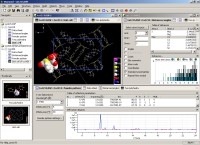 |
Multiple structure data sets, multiple pictures
The new Diamond 3 document format enables storage of multiple structure data
sets as well as multiple structure pictures. New desktop elements are:
-
the table of data sets,
-
an overview of pictures (as thumbnails) associated with a dataset or with the
whole document,
-
the navigation tree,
-
several new views (powder pattern, distances and angles, properties, etc.).
|
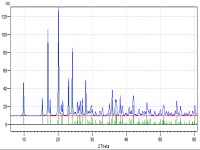 |
Powder pattern simulation
Powder diffraction data can now be calculated and displayed in both table
and diagram. Table and diagram update automatically when
structure parameters change.
|
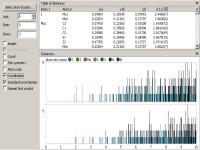 |
Properties pane and more auxiliary views
The new Properties pane shows informations in context with the current
situation, e.g. properties of the selected atom, distances around the selected
atom, centroid or best plane or line through selected atoms, and many more.
Distances and angles table now provide histograms and statistics.
The data brief for a short overview of structure parameter data.
The Info Tip window gives you information about the object under the mouse
cursor. |
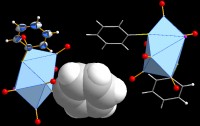 |
Individual assignment of model
In Diamond 2, the model (ball-and-stick, space-filling etc.) was a global
setting. Now it can be assigned individually to selected atoms. That means you
can display ball-and-stick, space-filling, ellipsoid, and sticks or wires in
one and the same picture.
|
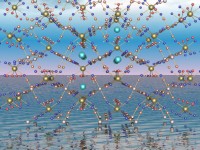 |
Create POV-Ray scenes
The POV-Ray assistant helps you to create photo-realistic pictures for this
outstanding, free available ray-tracer, with features like textures,
background, ray-tracing, multiple light sources, etc.
|
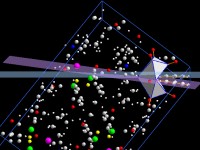 |
Geometry
enhancements: Planes, lines and more
Planes can now be defined by hkl or as (best) plane through a set of three or
more atoms (or a line through two or more atoms). The planarity (linearity) can
be checked.
Besides this, distances of atoms from planes or lines as well as angles between
planes and/or lines can be calculated or measured interactively.
|
|
More
features and enhancements
-
Assistant for creation of animation scenes,
-
walk-through mode,
-
composition of pictures from different data sets,
-
support of "molecular data" (structure data with no cell and symmetry),
-
a step-by-step assistant for users who are not so familiar with Diamond,
-
an automatic picture creation,
-
cut/copy/paste between structures and pictures,
-
printout of multiple pictures per page,
-
and more.
|
|


